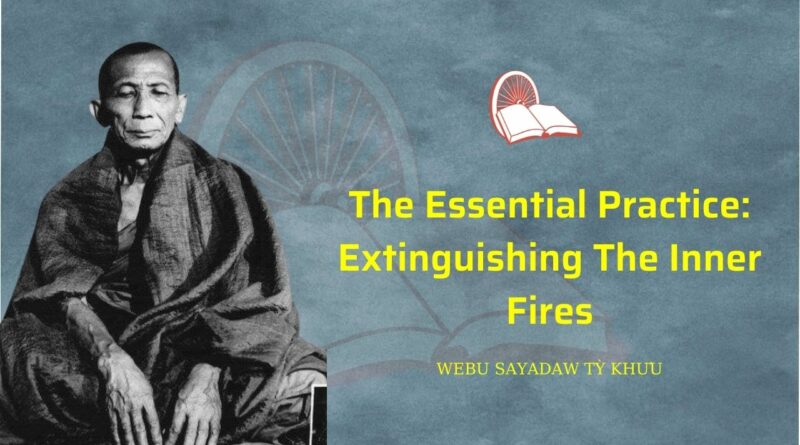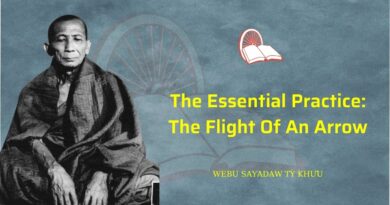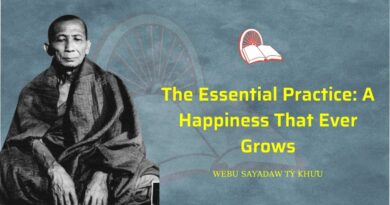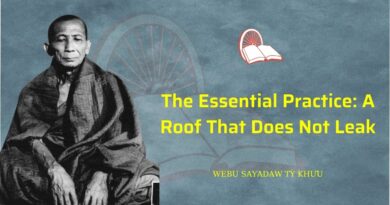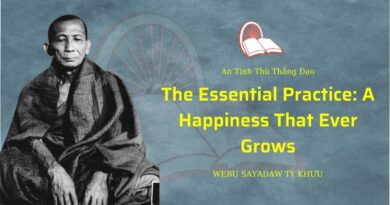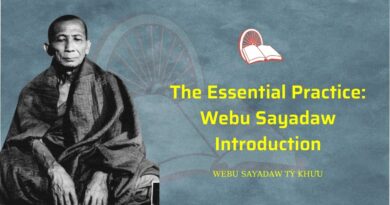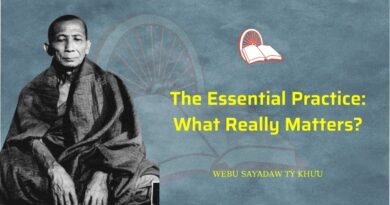Nội Dung Chính
- Part I
- Part II
Extinguishing the Inner Fires
WEBU SAYADAW: There are duties towards the cetiya,[1] the Bodhi tree, towards teachers, parents, wife and children. If we fulfill these, we practice good conduct (carana) and this is morality (sila).
While we are fulfilling our duties, is it not possible to practice mindfulness of breathing also? If we do not fulfill these duties, can we say that our morality is complete? If our morality is not perfect, can we expect to experience the happiness we aspire for? If we are not happy, if our mind is not concentrated, we can’t attain insight-wisdom (pañña).
Today is Uposatha day.[2] At dawn you all woke up with the thought, “Today is Uposatha day,” and you undertook to keep the eight precepts. Have you been mindful continuously since then?
DISCIPLE: No, sir, we haven’t.
S: How much of this time have you spent being aware of the in-breath and out-breath?
D: At times we are aware, sir, at times we are not, sir.
S: How long did your mind stay with the object and how much time did you lose?… As you remain silent, I assume that you have been able to keep up your awareness all the time.
D: No, sir, we haven’t.
S: In that case I have to ask you some more questions. How many times does your mind dissolve in a flash of lightning?
D: Billions and billions of times, sir.
S: So it arises and disintegrates billions of times. Every time the mind arises it takes some object, pleasant or unpleasant, liked or disliked. Is there a time when this constant continuous stream of mental objects is cut off or interrupted?
D: No, sir, the mind always takes an object.
S: Yes, and these good and bad friends arise in your mind due to the skillful and unskillful deeds or kamma you have done in the past. Now, if a pleasant object which we call a good friend enters the stream of consciousness, what happens?
D: Liking or greed arises, sir.
S: If liking arises, is this good or bad?
D: It is bad, sir.
S: But if a bad friend, an unpleasant mind-object arises, what happens then?
D: Dislike or aversion arises, sir.
S: If we allow aversion or dislike to arise, is this skillful or unskillful?
D: It is unskillful, sir.
S: So, if we accept the agreeable mind-objects, liking, craving, wanting and lust arise and we are creating unskillful acts which lead to the four lower planes of existence. But if unpleasant thoughts or images arise and we take possession of them, then worry, grief, suffering, anger and aversion arise and these mental states lead to the lower planes too. Now, at what time does no pleasant or unpleasant thought or image or sound or sight or taste or touch arise?
D: There is no such time, sir. The mind always takes an object.
S: And all these objects arising in our minds are the results of the deeds you have done in the past, in samsara. Be an object pleasant or unpleasant, when it arises, what do you normally do?
D: We react unskillfully and create bad karma for ourselves, sir.
S: If a pleasant object arises in the mind, liking, craving, wanting arise. This craving, what is it like? Is it not like a fire? Craving is like a fire. What about disliking, aversion and hatred?
D: That is also like a fire, sir.
S: So, whatever arises, we have to suffer the burning of fire, don’t we?
D: Yes, sir.
S: But of course, if greed and aversion have to arise, let them arise. If we are practicing the teachings of the Buddha, can they affect us? While we are practicing meditation on the breath greed and aversion don’t get an opportunity to possess our minds.
The teachings of the Buddha resemble the great lake Anotatta.[3] If the fires of greed or aversion or any other fires fall into this lake, they are extinguished and we don’t have to suffer their scorching heat any longer. Only if we know each arisal of the mind in the billions of times it arises in a split-second, can we justly say that we have achieved real wisdom and insight.
Mind and body arise billions of times in the wink of an eye, and with it your good and bad friends. If you are not watchful, these good and bad deeds of yours will again be accumulated in you billions of times. Now, who is responsible for the pleasant and unpleasant sensations that continuously arise in your body?
D: We are responsible for them ourselves, sir.
S: The debts you have accumulated in the incalculably long period of samsara are with you. If you don’t apply the Buddha’s teachings and practice, you will accumulate the same debts again and again, billions of times in every split-second. Are you able to count these debts?
D: No, sir, they are incalculable.
S: Therefore you should apply this practice the Buddha taught. If you don’t accept what arises and disintegrates of its own accord then your accumulated debts will diminish and no new debts will be accumulated. If you realize this arising and vanishing for yourselves, then you don’t make new debts and you get rid of the old ones. Thus you attain to the higher wisdom.
This technique of being aware of in-breath and out-breath can be practiced anywhere. You can practice it while you are alone or in company, while you are sitting, walking, standing or lying down. Wherever you are you can practice it. Now, do you have to spend money in order to practice this meditation?
D: No, sir.
S: Do you have to take time off work to practice?
D: No, sir.
S: In that case, what is so difficult about it? Will this practice make you feel tired?
D: No, sir.
S: If you make great profit in your business and people ask you “How much gold, how much silver have you got,” will you tell them?
D: No, sir.
S: And why not?
D: One shouldn’t tell others such things, sir.
S: Now, which jewel is more precious, gold and silver, or the Dhamma?
D: The Dhamma is more precious, sir.
S: Then don’t talk to others about your achievements. What is the time now?
D: Seven p.m., sir.
S: How much time have you got left until sunrise?
D: About ten hours, sir.
S: Do you think that you can practice meditation for that long without a break? Work hard to rid yourselves of your debts. The efforts of the past and meritorious deeds performed in the past are giving their good results.

